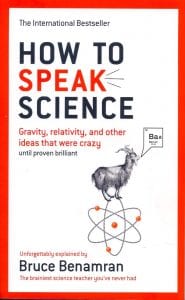 I can’t remember a book where my mental picture of what the star rating would be has varied so much. At first glance, it looked like a solid 4 star title. It looks fun (despite the odd title – it sounds like it’s a book on public speaking for geeks) and a flick through showed that it covers a huge amount of science topics, mostly physics – so it was promising as a beginner’s overview. There is one small issue to be got out of the way on the coverage side. There’s a whole lot of physics, with a gaping hole that is quantum theory. More on that later.
I can’t remember a book where my mental picture of what the star rating would be has varied so much. At first glance, it looked like a solid 4 star title. It looks fun (despite the odd title – it sounds like it’s a book on public speaking for geeks) and a flick through showed that it covers a huge amount of science topics, mostly physics – so it was promising as a beginner’s overview. There is one small issue to be got out of the way on the coverage side. There’s a whole lot of physics, with a gaping hole that is quantum theory. More on that later.
After reading a few pages, I had to downgrade that score to 3 stars because of the writing style. It oozes smugness. All became clear when I read the words ‘For those of you who aren’t familiar with my YouTube channel.’ How to Speak Science reads like a transcript of a YouTube rant. The reason I love reading books and can hardly ever be bothered to watch videos is to get away from this kind of thing. However, I accept there is a whole generation for whom videos are more accessible than books – maybe it will appeal to them. But I suspect even YouTube fans might tire of the repeated use of ‘people – the species not the magazine.’ (There’s a magazine?)
A good example of the feel is Bruce Benamran’s treatment of Aristotle. We’ve all done a little Aristotle bashing in our time. It’s hard not to when, for example, he decided women had fewer teeth than men without ever checking. But to repeatedly go on about it in an over-the-top fashion misses both that Aristotle was not a scientist, he was a philosopher, and that sometimes he did get things right – particularly in natural history, but he even prefigured Newton’s first law of motion (admittedly to disprove the existence of the void).
So, when Benamran starts off by saying ‘On one side we had Aristotelians; on the other side we had … intelligent people,’ and spends several pages knocking Aristotle it feels more like bluster than information. It doesn’t help that the initial comment was about Aristotle’s approach to matter when compared to the atomists. Yet at the time, Aristotle’s model was arguably the more scientific – you could make predictions from it. The atomists’ ideas were very different from modern atomic theory and fairly useless as science.
Still, I was prepared to accept a style that wasn’t for me if the content was good. Unfortunately, in the first section this too has some real problems that dragged that mental indicator down to 2 stars or lower. The first part of the book is almost entirely history of science – and there are a considerable number of errors. Every writer makes a few mistakes. And I don’t really worry if a book, say, gives Giordarno Bruno more credit than he deserves. (Interestingly, Benamran, who is clearly a Bruno fanboy, fails to list all Bruno’s wildly unscientific concepts, a very different treatment to that he gives to Aristotle.) But some of the mistakes were way off the mark. To list a few:
- We are told that after the loss of the library at Alexandria ‘the Western world lost all trace of the great thinkers of ancient times until rediscovering them in 1453.’ So when, for example, Roger Bacon made hundreds of references to Aristotle and other ancient Greeks’ work in his Opus Majus from 1267, he was just making it up?
- The ‘plums’ in the plum pudding model, we are told, were prunes. No – a plum pudding is a Christmas pudding, so we’re talking sultanas and raisins.
- We are told that until the Renaissance pretty much no one wondered why they couldn’t see at night, given the prevailing idea that light was emitted by the eyes. Obviously, even when this idea was dominant they did wonder and came up with explanations – and theories of light were already far more sophisticated than ancient Greek ideas by the 1200s.
- We are told of second century Greek astronomer Ptolemy ‘to whom we owe the geocentric model’ – really?
- Apparently ‘Galileo was definitely the first person to use a telescope to look at the sky and make scientific observations.’ Unfortunately, Thomas Harriot made astronomical observations several months earlier, and it’s entirely likely some of the other early telescope makers also beat Galileo to it.
How to Speak Science - Bruce Benamran - Virgin Books 2018

